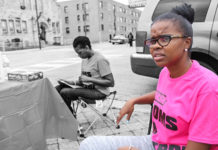Teachers’ unions say they hate top-down mandates of bossy bureaucrats and politicians who suppress the voices of teachers. Yet, there may be a gap between their rhetoric and their reality.
They speak of teachers’ unions as democratic instruments of rank and file teachers, but the reality on the ground is teachers can be marginalized as much by their own union bosses as politicos.
That’s my takeaway after reading Chicago parent and educator Alana Baum’s commentary in the Chicago Tribune. The title says it all: “I support Chicago teachers — but not their union”
Baum says even union supporting teachers and parents experience fear of speaking up when they don’t agree with their union’s leadership. This fear creates two things that are dangerous for any organization: silence and sheep. Fearful teachers who won’t share their dissenting views with colleagues stand in the cold shadows of those who put on the red shirt for their leaders, even when those leaders push for things that are not good for children, their school system, or their city.
The possibility of another teachers strike stirs Baum, and she questions how educators can thinking critically about the path forward for Chicagoans.
In 2012 when the CTU went on strike, I was relatively new to Chicago Public Schools, with twin 8-year-olds. I felt torn — frustrated that our city’s kids were missing needed school days, favoring longer ones, but angry that promised teacher pensions had been squandered. I was angry at politicians who let this happen. Today, as a veteran CPS parent and local school council member, I have a better understanding of what’s needed in classrooms, what’s important to students and teachers, where we’re starting to succeed and where we still must do better. I also have a better sense of how we got here. So I struggle with the unilateral blame that the CTU incites and how effectively they are serving teachers.
Years before Rahm Emanuel became mayor, the CTU leadership negotiated contracts with the city. They knew about underfunded pensions, yet continuously chose to ignore them, negotiating salary increases instead. Did they send emails to members alerting them of an impending crisis? No.
The teacher pension problem in Chicago and elsewhere is a big hairy ball of ugly made worse by historic political complexities and convenient blame shifting, a fact that makes Baum wonder “[h]ow is it that [the Chicago Teachers’ Union] now blame an administration that came in years after the damage, one that has actually pushed to start addressing the pension problem?”
Instead of recognizing an opportunity to – for once – unify parents, educators, and education leaders to attack the real problem, the fact that Illinois is among the worst for education funding, the CTU appears to be spoiling for a divisive strike. Again.
Baum says:
At a time when all Chicagoans are being asked to sacrifice with higher taxes, when kids need an education and teachers need paychecks, they’ll be told to strike. I say “told” because too many teachers privately say they support their colleagues but don’t believe they can question their union.
This could be a moment when the teachers’ union halt their culture of continuous grievance and choose to be active partners in a struggling district ecosystem. We can dream, right?
Baum’s clearly written, fairly stated piece raises a hugely important question about what happens when unions start telling their members what to think and what to support.
How is that strong arming style different than the arbitrary power of any other soul-crushing, infantilizing entity?
If the CTU completes their internal process necessary to stage a strike it may be a bridge too far for Chicagoans, including those that support the union. Baum says she will support her rank and file colleagues. She will bring them food and well wishes.
She’ll do it with one caveat: “But I no longer support your union, which I believe has lost its way, and our children’s and your best interests.”
That’s a good call out for school reform stalwarts to hear. You can support teachers and their need for job protections even if their unions fail to be good partners in strengthening school districts.











Teachers vote, via secret ballot, whether to strike or not. That’s called democracy.